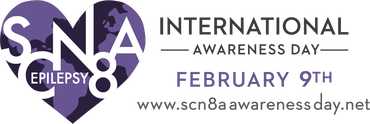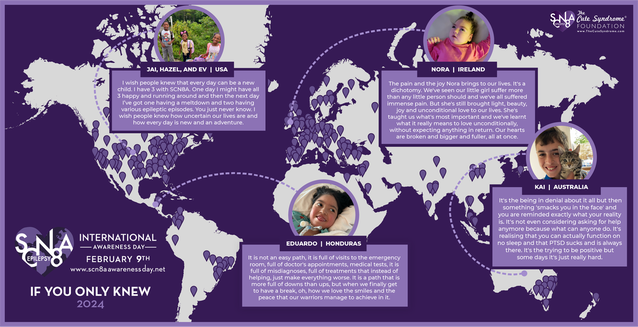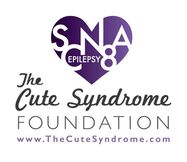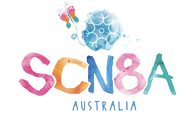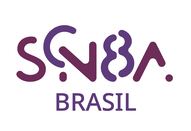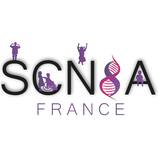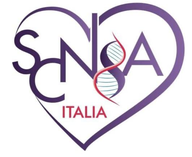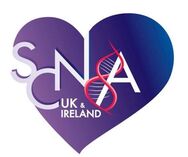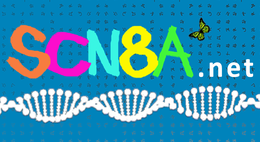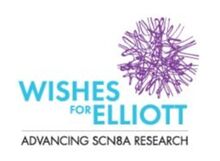|
SCN8A is a rare disorder that is known to affect ~550 individuals worldwide. It can cause severe epilepsy, developmental delay, and other medical challenges. The gene SCN8A was isolated in humans by Michael Hammer, PhD, a geneticist who found the gene in his own daughter, Shay, soon after her death in 2011. We celebrate SCN8A Awareness Day on February 9th, Shay Hammer's birthday.
Use the graphics and messages in our toolkit to help us raise awareness! |
SCN8A Awareness Day 2024: #IfYouOnlyKnew
|
|
Watch all our videos from previous years:
2023: Celebrate Today 2022: Our Cute Story 2021: Against All Odds 2020: Stronger Together 2019: We Choose Hope 2018: Keep Moving Forward 2017: First Awareness Day SCN8A Awareness Day Playlist |
About the first International SCN8A Awareness Day
The first International SCN8A Awareness Day was February 9th, 2017.
Family-based advocacy organizations including Ajude o Rafa, The Cute Syndrome Foundation, and Wishes for Elliott—as well as individual families—shared the story of the grave impacts of this newly identified epilepsy.
February 9th, 2017 marked what would have been the 21st birthday for Shay Hammer whose father Michael, at the time a population geneticist, was the first to isolate the SCN8A gene as the cause of his daughter’s struggle with epilepsy. Sadly the discovery came weeks after Shay’s sudden and unexpected death in 2011 at 15 years old – the first documented case of SUDEP in a child with an SCN8A mutation.
Michael Hammer has since dedicated his life and professional work as a geneticist to advancing the scientific understanding of this devastating disorder. He has developed an innovative and powerful online registry for children with SCN8A. All proceeds from sponsored events and contributions to the three organizations during this period were dedicated to supporting the www.scn8a.net efforts.
Family-based advocacy organizations including Ajude o Rafa, The Cute Syndrome Foundation, and Wishes for Elliott—as well as individual families—shared the story of the grave impacts of this newly identified epilepsy.
February 9th, 2017 marked what would have been the 21st birthday for Shay Hammer whose father Michael, at the time a population geneticist, was the first to isolate the SCN8A gene as the cause of his daughter’s struggle with epilepsy. Sadly the discovery came weeks after Shay’s sudden and unexpected death in 2011 at 15 years old – the first documented case of SUDEP in a child with an SCN8A mutation.
Michael Hammer has since dedicated his life and professional work as a geneticist to advancing the scientific understanding of this devastating disorder. He has developed an innovative and powerful online registry for children with SCN8A. All proceeds from sponsored events and contributions to the three organizations during this period were dedicated to supporting the www.scn8a.net efforts.
About SCN8A
What is SCN8A?
SCN8A is a gene that encodes a voltage-gated sodium channel and affects how brain cells function. Mutations on this gene can cause neurological problems that may include epilepsy and learning difficulties. The SCN8A gene was isolated in mice in 1995, and the role of SCN8A in the human brain was discovered in 2012. Since then, ~550 patients have been diagnosed with SCN8A mutations. Due to advances in genetic testing, more patients are being discovered all the time.
What problems do SCN8A mutations cause?
Many with SCN8A mutations have epilepsy that is resistant to treatment - they may have seizures every day and need to be hospitalized often. Non-seizure symptoms often include learning difficulties, muscle spasms, low or high muscle tone, poor coordination, developmental delay, and autism spectrum disorder. Many children will have trouble learning to speak, and some will need assistance from feeding tubes to get the nourishment they need to grow.
There is still much to be discovered about SCN8A and it's effects. While many have epilepsy and other medical challenges, some may develop fairly typically, and others may never have any seizures. Like many rare disorders, families and their efforts to advance research offer the greatest hope for these beautiful children who deserve answers.
What is the treatment for SCN8A?
There is currently no standard treatment for SCN8A. Treatment will depend on the type and severity of symptoms. SCN8A epilepsy is commonly drug resistant, but has shown a positive response to sodium channel blockers in many cases. Two SCN8A-focused clinical trials are currently recruiting. Learn more at clinicaltrials.gov.
SCN8A is a gene that encodes a voltage-gated sodium channel and affects how brain cells function. Mutations on this gene can cause neurological problems that may include epilepsy and learning difficulties. The SCN8A gene was isolated in mice in 1995, and the role of SCN8A in the human brain was discovered in 2012. Since then, ~550 patients have been diagnosed with SCN8A mutations. Due to advances in genetic testing, more patients are being discovered all the time.
What problems do SCN8A mutations cause?
Many with SCN8A mutations have epilepsy that is resistant to treatment - they may have seizures every day and need to be hospitalized often. Non-seizure symptoms often include learning difficulties, muscle spasms, low or high muscle tone, poor coordination, developmental delay, and autism spectrum disorder. Many children will have trouble learning to speak, and some will need assistance from feeding tubes to get the nourishment they need to grow.
There is still much to be discovered about SCN8A and it's effects. While many have epilepsy and other medical challenges, some may develop fairly typically, and others may never have any seizures. Like many rare disorders, families and their efforts to advance research offer the greatest hope for these beautiful children who deserve answers.
What is the treatment for SCN8A?
There is currently no standard treatment for SCN8A. Treatment will depend on the type and severity of symptoms. SCN8A epilepsy is commonly drug resistant, but has shown a positive response to sodium channel blockers in many cases. Two SCN8A-focused clinical trials are currently recruiting. Learn more at clinicaltrials.gov.
SCN8A Awareness and Research Organizations
SCN8A Brasil |
SCN8A European Federation |
SCN8A France |
SCN8A Italia |
SCN8A Nederland |
Buy Awareness Day Gear!
|
Your purchase of SCN8A Awareness Day gear helps support The Cute Syndrome Foundation as we work within the exceptional SCN8A community! You can also help us spread awareness around the world on International SCN8A Awareness Day, February 9th—and throughout the year—by wearing and using your SCN8A Awareness Day gear!
Share a photo on social media with the tags: #IfYouOnlyKnew #scn8aStrong #scn8aAwareness #InternationalSCN8AAwarenessDay |
Website maintained by The Cute Syndrome Foundation
